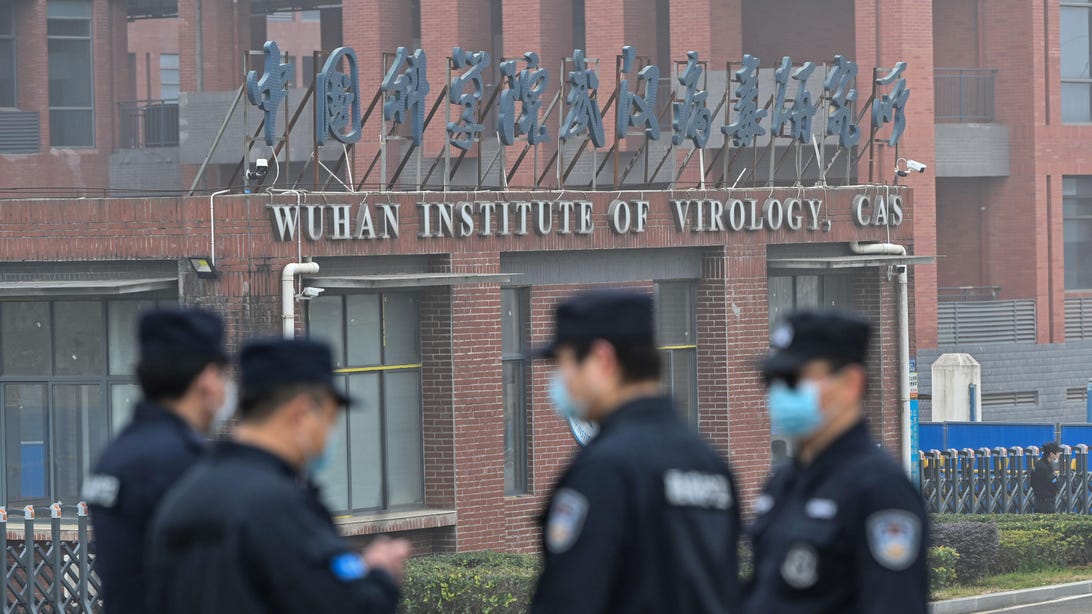
A new letter in the journal Science argues for a transparent, data-driven inquiry into the origins of the pandemic.
Hector Retamal/Getty
Since the coronavirus emerged in the central Chinese city of Wuhan 17 months ago, scientists have been perplexed by its origin. As many nations accelerate vaccine rollouts and begin to bring outbreaks under control, looking toward the end of the pandemic, some are beginning to look backward to try to understand how it began.
Knowing where the virus came from is central to preventing the next pandemic, but untangling the origins of the coronavirus SARS-CoV-2, which causes COVID-19, has become a complex, messy issue, needlessly complicated by politicking and conspiracy. Two hypotheses have been floated by scientists. One, the virus emerged naturally, likely in bats, and spilled over into humans. Or, two, it accidentally leaked from a laboratory in Wuhan where coronavirus research was being conducted.
There is insufficient data to rule out either theory — but a cadre of scientists is hoping to change that.
In a new letter published Thursday in Science, one of the world’s top academic journals, 18 international experts in virology, molecular biology, evolutionary biology and epidemiology call for a “proper investigation” into the origins of the pandemic, highlighting the need for a transparent, objective and data-driven analysis of SARS-CoV-2’s emergence. The signatories include Ralph Baric, an eminent coronavirus researcher from the University of North Carolina, Akiko Iwasaki, an immunologist at Yale, and was spearheaded by Jesse Bloom, an evolutionary virologist at the University of Washington, and David Relman, a microbiologist at Stanford University.
The letter argues that the recent China-WHO joint study conducted in Wuhan, in January and February of this year, did not give “balanced consideration” to the laboratory leak theory, instead focusing its attention on the spillover hypothesis.
“Only 4 of the 313 pages of the report and its annexes addressed the possibility of a laboratory accident,” the authors write.
Members of the joint study visited the lab at the center of the leak hypothesis, the Wuhan Institute of Virology, on Feb. 3, but did not obtain access to data.
The letter also highlights statements made by the director general of the World Health Organization, Tedros Adhanom Ghebreyesus, after the joint study’s findings were released on March 30. Ghebreyesus concluded that the assessment of the laboratory leak was not extensive enough and said the team had trouble accessing raw data in Wuhan.
Although the joint study includes only scant analysis of the lab leak theory, the China and WHO team branded it “extremely unlikely,” while suggesting a spillover event from nature was “likely to very likely.” A third, widely denounced hypothesis argued that SARS-CoV-2 may have been transported to Wuhan in or on frozen food packaging.
Though the joint study concluded there is no conclusive evidence of foodborne transmission, it deemed this scenario “possible,” making the study’s ruling on a lab leak all the more confusing.
The Science letter is an attempt to correct the record and push an investigation forward.
“The China-WHO joint study reporting was giving the public the wrong impression that a lab escape was extremely unlikely,” said Alina Chan, molecular biologist at the Broad Institute of MIT and Harvard and co-author of the letter.
But why now? The resurgence of the lab leak theory has been spurred by a new administration in the US and the belief among a growing number of scientists that the China-WHO joint study was not comprehensive enough.
Though scientists maintain that a large body of epidemiological and genomic data suggest the virus spilled over in a market in Wuhan, calls for an independent inquiry into its origins have been getting louder. An open letter, published by a team of independent scientists and analysts known as the Paris Group, called for an inquiry into the origins in early March.
Other high-profile figures also welcome further study, including Anthony Fauci, head of the US National Institute of Allergy and Infectious Diseases. In exchanges with Sen. Rand Paul at a Senate Health Committee hearing on Tuesday, Fauci said “I am fully in favor of any further investigation of what went on in China.”
The authors of the letter note discussion of the coronavirus origins has become a difficult issue, complicated by rising anti-Asian sentiment in some countries. Some believe Donald Trump’s problematic use of racist terminology for the coronavirus helped spur a rise in anti-Asian hate last year.
Within the letter, the authors try to depoliticize the calls for an investigation from the rhetoric, drawing attention to “the Chinese doctors, scientists, journalists and citizens who shared with the world crucial information about the spread of the virus — often at great personal cost.”
In the past year, political and xenophobic rhetoric was a mainstay of the origins discussion. Now, the authors say, a “dispassionate science-based discourse” is required.
See also: 16 important do’s and don’ts for getting your COVID-19 vaccine